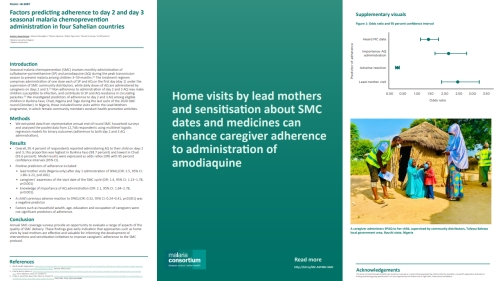
Publication Date:
16/11/2021
Author:
Taiwo Ibinaiye
Adaeze Aidenagbon
Chibuzo Oguoma
Olabisi Ogunmola
Olusola Oresanya
Sol Richardson
Type:
Poster

Factors predicting adherence to day two and day three seasonal malaria chemoprevention administration in four Sahelian countries
Publication Date:16/11/2021
Author:
Taiwo Ibinaiye
Adaeze Aidenagbon
Chibuzo Oguoma
Olabisi Ogunmola
Olusola Oresanya
Sol Richardson
Type:
Poster
Home visits by lead mothers and sensitisation about SMC dates and medicines can enhance caregiver adherence to administration of amodiaquine.
Seasonal malaria chemoprevention (SMC) involves monthly administration of sulfadoxine–pyrimethamine (SP) and amodiaquine (AQ) during the peak transmission season to prevent malaria among children 3–59 months. The treatment regimen comprises administration of one dose each of SP and AQ on the first day (day 1) under the supervision of SMC community distributors, while daily doses of AQ are administered by caregivers on days 2 and 3. Non-adherence to administration of day 2 and 3 AQ may make children susceptible to infection, and contribute to SP and AQ resistance in circulating parasites. We investigated predictors of adherence to day 2 and 3 AQ among eligible children in Burkina Faso, Chad, Nigeria and Togo during the last cycle of the 2020 SMC round (October). In Nigeria, these included home visits within the Lead Mothers programme, in which female community members conduct health promotion activities.
This poster was presented at the 70th annual meeting of the American Society of Tropical Medicine and Hygiene.
Country: Burkina Faso | Chad | Nigeria | Togo
Keywords: Community delivery | Child and maternal health | Malaria | SMC | SDGs
« Back to Publications